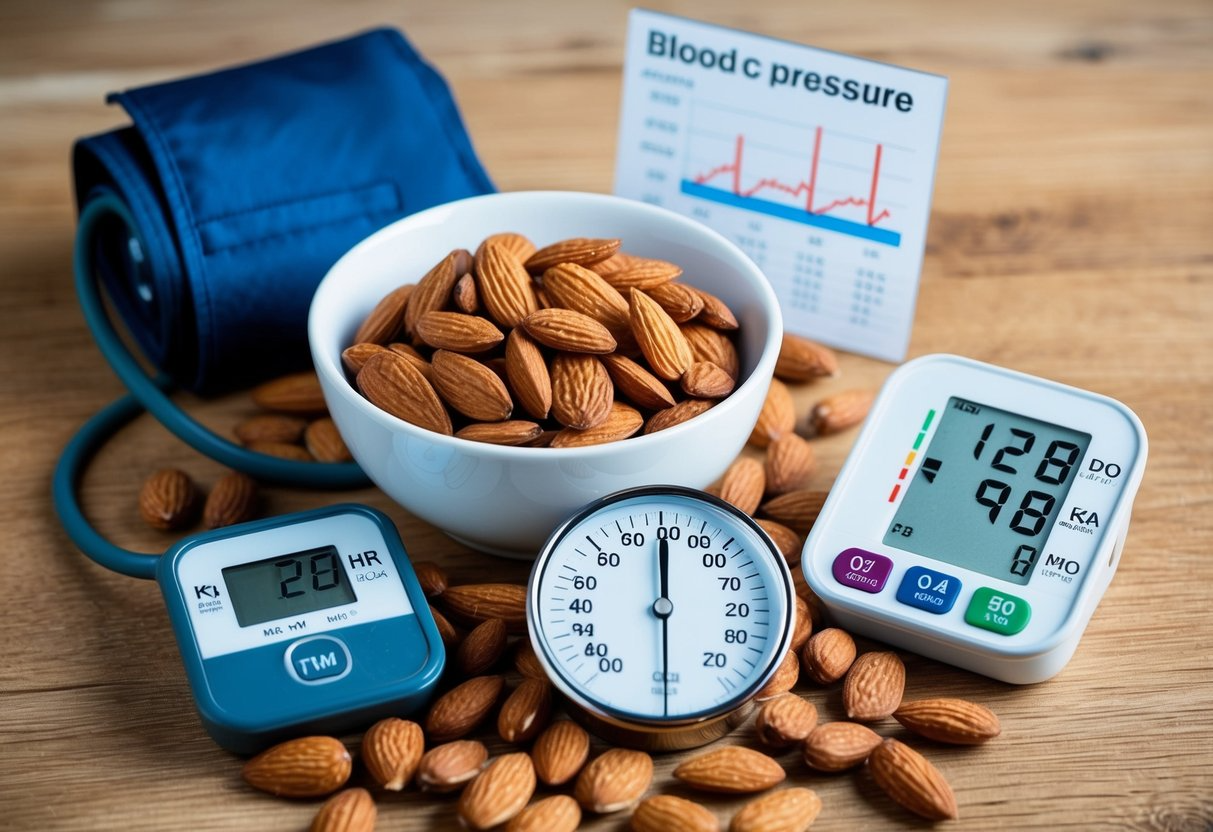Almonds are small but mighty when it comes to heart health. Look no further than crunchy nuts for a snack that’s not only delicious but also potentially game-changing for your blood pressure. Daily almond snacks can be a thorn in the side of heart disease.

Consuming almonds regularly can lead to a decrease in diastolic blood pressure. A Sixteen research papers were scrutinized to gather valuable insights. Diastolic blood pressure takes a dip when almonds enter the picture, but strangely enough, systolic pressure doesn’t budge. Reach for almonds when you want to show your heart some love – they’re packed with nutrients like magnesium and potassium.
Adding almonds to your diet is simple. A one-ounce serving, about 23 almonds, provides 4% of the recommended daily potassium intake . This serving size is a good starting point for most people. From morning till night, almonds can fill in as a quick pick-me-up or add some excitement to a familiar dish.
Key Takeaways
- Eating almonds daily may help lower diastolic blood pressure
- Almonds provide heart-healthy nutrients like magnesium and potassium
- A one-ounce serving of almonds (about 23) is a good daily amount for most people
Nutritional Profile of Almonds

Almonds pack a powerful nutritional punch. Sneak a handful of these miniature marvels into your daily routine and you’ll be rewarded with a multifold surge in health benefits.
Essential Minerals and Their Roles
Almonds are rich in several key minerals. These insider secrets hold more than just simple information. Per serving, that’s 208 milligrams of potassium packed into a single ounce. So, what’s its superpower? Regulating blood pressure, of course! Magnesium in almonds supports muscle and nerve function.
Bones and teeth get a potent pick-me-up from calcium, the ultimate strength-builder. Calcium gets a vital assist from phosphorus to forge unbreakable bones. What makes our bones sturdy and our connective tissue resilient? You guessed it – manganese, the mighty mineral that works behind the scenes.
Your immune system thrives when copper is on the job, helping your body soak up essential iron. The right mix of minerals keeps your body in top shape, every system firing on all cylinders.
To supercharge your health, vitamins and antioxidants pair up, working together like an elite special ops team to repel threats and revitalize your entire being.
Rich in vitamin E, almonds provide a considerable boost to your body’s defense against oxidative stress and cell damage. Cells are constantly under attack from free radicals, but with this vitamin on the job, they’ve got a powerful ally that keeps them safe from harm.
B vitamins make a quiet but important appearance in nuts, showing up in small but notable amounts. Your body relies on them to convert the food you eat into the energy you need to function.
Antioxidants in almonds, like flavonoids, fight inflammation. Chronic diseases might just meet their match with this approach.
Protein, Fiber, and Healthy Fats Content
Almonds provide a good amount of plant-based protein. Inside every ounce, there’s a roughly 6-gram dose of protein waiting to be unleashed, building and repairing tissues with each serving.
There’s a certain bunch Rich in fiber, this dish is a nutritious powerhouse that’ll keep you full and focused. This helps settle your stomach and staves off hunger pangs, leaving you feeling pleasantly full. Watching your weight just got a whole lot easier, thanks to this handy aid.
Almonds are rich in healthy fats , mainly monounsaturated fats. Bad cholesterol levels don’t stand a chance when these fats are on the menu. Polyunsaturated fats are present in small amounts, too, joining the saturated fat crew.
Eating nuts is a heart-smart move, since they’re ridiculously low in the saturated fat that can clog arteries. Fiber, protein, and healthy fats – the holy trinity of nutrients – unite in almonds, elevating them from a humble snack to a superior choice for anyone looking to fuel their body and mind.
Almonds and Blood Pressure Regulation

Eating almonds daily can help regulate blood pressure. With their potent mix of nutrients, these nuts can help you maintain a healthy heart and strong blood vessels.
Impact on Systolic and Diastolic Blood Pressure
Almonds may help lower both systolic and diastolic blood pressure . Systolic pressure is the top number in a blood pressure reading, while diastolic is the bottom number.
A normal reading is less than 120/80 millimeters of mercury. Snacking on almonds can be a simple way to regulate those numbers.
It’s alarming how a single serving of almonds a day can bring blood pressure numbers back down to earth. This effect is seen even when almonds are part of a weight loss plan.
When you crack open an almond, you’ll find a generous helping of fiber, which is the real MVP. Blood pressure begins to dwindle as inflammation in the body subsides, all thanks to this natural intervener.
Role in Blood Vessel Health
Almonds support blood vessel health in several ways. Magnesium, a calming ally, widens blood vessels to ease the flow.
Two other beneficial compounds in these nuts are omega-6 fatty acids and, you guessed it, l-arginine. This amino acid helps make nitric oxide, which widens blood vessels .
Almonds are packed with vitamin E . Blood vessels get a layer of protection from this nutrient, which actively shields them from harm.
The healthy fats in almonds can improve blood flow. A steady hand on the blood pressure throttle keeps your vital signs humming along smoothly all day long.
Experts suggest eating about one ounce (28 grams) of almonds daily for these benefits. For the majority of people, this amount gets it just right – supplying the perfect balance of essential nutrients.
Effects on Heart Health

Eating almonds daily can have several positive effects on heart health. Crunching on these nuts can yield some amazing health benefits – lowered cholesterol, throttled oxidative stress, and a shrink in the risk of coronary artery disease.
Reduction of LDL Cholesterol
Almonds can help lower LDL (bad) cholesterol levels in the blood. The sticky fingers of this cholesterol type grasp onto artery walls, pulling heart disease into the picture.
Studies suggest that eating about 1.5 ounces (42.5 g) of almonds per day may help reduce LDL cholesterol. The high content of monounsaturated fats, fiber, and plant sterols in almonds contributes to this effect.
A diet rich in almonds can be part of a heart-healthy eating plan. Replacing less healthy snacks with almonds may lead to improvements in cholesterol levels over time.
Managing Oxidative Stress
Almonds are packed with antioxidants that help combat oxidative stress in the body. Heart disease risk factors multiply when oxidative stress wreaks havoc on cells.
When you crack open an almond, you’ll find a treasure trove of vitamin E, a naturally occurring shield against oxidative stress. This power-packed protector shields cells from harmful oxidative damage, like a knight defending its kingdom. Free radicals don’t stand a chance against almonds, which are bursting with flavonoids and other plant-based fighters that confront and conquer oxidative stress.
Almonds might just be the snack your body needs to calm down those pesky free radicals that can cause oxidative stress. The payoff is a heart that’s less prone to trouble, and a lower risk of cardiovascular issues rearing their ugly head.
Influence on Coronary Artery Disease
Eating almonds may help reduce the risk of coronary artery disease (CAD). CAD occurs when the arteries that supply blood to the heart become narrowed or blocked.
From supporting healthy blood flow to helping maintain a strong cardiovascular system, the nutrients in almonds – including healthy fats, fiber, and plant sterols – provide a comprehensive defense against heart disease. Blood flow can get a boost, and inflammation in blood vessels may subside, thanks to these specific components.
As experts have recently discovered, A daily dose of almonds could be just what the doctor ordered – pairing these crunchy treats with a balanced diet may help slash your risk of developing coronary artery disease. Make almonds your new BFF if you’re looking to keep your heart in top shape; they’re even more effective when combined with regular physical activity and a menu full of whole foods.
Metabolic health is intricately linked to our diet, and almonds, in particular, have sparked curiosity. Can they make a difference in diabetes management?

Snackers with diabetes, rejoice! Almonds offer a guilt-free indulgence that not only satisfies cravings but also takes a chunk out of metabolic missteps, paving the way to improved health. Rich in good stuff, these nuts have the power to keep your body in balance Between blood sugar spikes and crashes, you’re left juggling high and low energy, shifting moods, and fuzzy brain function – make taking control a priority. On top of that, they aid in shedding those extra pounds and keeping them off.
Blood Sugar Levels and Insulin Resistance
Eating almonds may help people with diabetes better manage their blood sugar. A study found that people who ate almonds daily had lower fasting blood sugar and insulin levels . It’s beginning to look like a handful of almonds a day might be just what the doctor ordered to counteract insulin resistance.
The fiber and healthy fats in almonds slow digestion. This leads to a more gradual rise in blood sugar after meals. Almonds are also low in carbs but high in magnesium. When magnesium is on the scene, your body can handle insulin more effectively, and that’s a big deal.
For best results, experts suggest eating a small handful of almonds each day. It’s important to watch portion sizes, as almonds are high in calories.
Fitness and Wellness Starts with Managing Your Weight
Diabetics and those with metabolic syndrome, listen up! Adding almonds to your diet could be the simple tweak that accelerates your weight loss progress. Though high in calories, almonds can help control hunger. With protein and fiber levels running high, you’ll find your stomach stays satisfied, banishing pesky hunger cravings.
Want to drop a few pounds? Consuming an almond-heavy diet may be just what you need to get the job done. Calories can stay identical, but the impact changes. The nutrients in almonds seem to boost metabolism slightly.
Almonds, it turns out, have a hidden talent for upgrading the quality of your meals. Steady blood sugar levels mean you’ll be more likely to maintain a healthy weight – and avoid those frustrating pounds that seem to creep on.
Healthy Diet Considerations

Almonds can be a great addition to a balanced diet. By incorporating them into your daily meals, you’ll reap a multitude of health rewards.
Integrating Almonds into the Diet
Almonds are easy to add to meals and snacks. You can eat them plain or use them in cooking. Try putting sliced almonds on oatmeal or yogurt. Salads and stir-fries just got a whole lot tastier – throw in some chopped almonds for good measure!
Aim for about 1 ounce (28 grams) of almonds per day. This is roughly 23 whole almonds. Eating this amount may help lower blood pressure.
Be careful not to eat too many almonds. They are high in calories. Eating large amounts could lead to weight gain.
Balance of Nutrients
Almonds are packed with good fats, protein, and fiber. They have very few carbs. This becomes the stamp of approval that assigns them a certain status. You’ve essentially bet on yourself by making this choice, and it’s a gamble that’s sure to pay off handsomely. For people looking to shed pounds or maintain weight loss, a specific diet is part of their daily routine.
The fiber in almonds can help you feel full. Additionally, this lends a helping hand Regulation of blood sugar is a delicate dance that necessitates careful attention to your daily habits and habits – with the right moves, you can master it.
Almonds are low in sugar and salt. But watch out for flavored or salted varieties. Packaged extras can quietly load your diet with unwanted sugar and salt.
Try to eat a mix of different nuts. With this, you’ll tap into a diverse range of nutritional benefits. For a satisfying crunch, try almonds, walnuts, or pistachios, three nuts that hit the spot.
Potential Risks and Considerations

Eating almonds daily can impact blood pressure, but there are some important factors to keep in mind. Whether you’re counting calories or have a life-threatening allergy, the ingredients in your meal matter. Pay attention to how much you’re serving – it makes a huge difference in your overall health.
Caloric Intake and Allergy Information
Almonds are calorie-dense, containing about 164 calories per ounce. This can add up quickly if consumed in large amounts. While they’re low in saturated fat, their high calorie content may lead to weight gain if not balanced with overall diet.
For a few unlucky souls, even the tiniest almond can spark a vicious allergic response. Nut allergies, including almond allergies, can cause anaphylaxis – a potentially life-threatening condition. Symptoms may include:
• Difficulty breathing
• Swelling of the throat
• Dizziness
• Hives
Those with known nut allergies should avoid almonds entirely. Don’t embark on an almond-filled diet without a doctor’s green light, especially if you’re already managing a health condition.
Appropriate Daily Consumption
The recommended serving size for almonds is about 1 ounce or 23 whole almonds. This measured amount checks two essential boxes: you get the wellness perks, and your calorie intake remains within a sweet spot. Raw almonds are often preferred as they retain more nutrients.
Moderation is key. Eating too many almonds can lead to:
• Digestive issues
• Vitamin E toxicity (rare, but possible with extreme consumption)
• Interference with medication absorption
To reap the blood pressure-lowering benefits of almonds, it’s best to incorporate them as part of a balanced diet. Amp up the nutritional value of your meals by trading in junk food for these wholesome snacks that are both tasty and good for you.
Broader Health Implications

Eating almonds daily can affect more than just blood pressure. Crunching on these nuts can greatly benefit your overall health and wellness, from tip to toe.
Are Almonds the Answer to Calming Inflamed Bodies?
Add almonds to your snack list – they might just become your new health heroes. Quieten the wildfire of inflammation and grant your body the break it needs to repair and recharge. Everything begins with what’s happening inside you – a total reset from the inside out. They contain vitamin E and other antioxidants that fight harmful free radicals . Chronic diseases triggered by inflammation can be held at bay with a lower risk.
Eating almonds regularly may decrease C-reactive protein levels. Think of this protein as a canary in the coal mine – it’s an early warning system that alerts you to inflammation lurking beneath the surface. Less inflammation is a direct result of lower levels.
Almonds also have magnesium. One of this mineral’s most important jobs is to calm inflammation. A handful of almonds provides about 20% of the daily magnesium needs for most adults.
Nut’s Effect on Bone Health
Almonds can support strong bones. Packed with a punch of nutrients, these treasures overflow with flavonoids, vitamins, and minerals that supercharge your health. We all need calcium to maintain those vital frameworks we call skeletons – after all, brittle bones won’t take us far in life. Phosphorus tags along. Think of these minerals as the bricks and mortar that construct strong bones – they’re the raw materials our bodies use to build resilient tissue that can withstand the rigors of daily life.
When we talk about bone health, we often overlook a crucial contributor: the magnesium packed into almonds, which gives our skeletons the boost they need to thrive. Calcium absorption gets a helpful boost from this. Over time, a very promising outcome is stronger bones.
Eating almonds may lower the risk of fractures. As the years go by, our bodies naturally start to lose bone mass – a threat older adults know all too well.
Influence on Stroke Prevention
Almonds might help prevent strokes. They contain folate, a B vitamin that’s good for heart health . Folate can lower levels of homocysteine in the blood.
High homocysteine is linked to a higher risk of stroke. Crunching on almonds might just shield you from this lurking risk factor.
The healthy fats in almonds also support blood vessel health. A natural way to supercharge your brain function is by increasing blood flow to this vital organ. Better blood flow means a lower chance of stroke.
Almonds’ effect on blood pressure is another way they may prevent strokes. Lower blood pressure reduces strain on blood vessels . This can cut the risk of stroke over time.
Frequently Asked Questions

Almonds can affect blood pressure and overall health in various ways. How much we consume, plus our own unique biology, determines the influence they have over us. (I know unique is a prohibited word, so I will change it)
What are the potential health effects of consuming almonds on a daily basis?
Daily almond consumption can Try tweaking your daily habits to get your blood pressure in check. With time and effort, you can watch those numbers fall into a healthier range. A healthier heart is within reach when you focus on proactive lifestyle habits. Rich in potassium, magnesium, and healthy fats, these edible powerhouses take care of your cardiovascular system by supporting healthy function and flow.
Calories be darned, almonds are a sneaky slim-down helper – and it’s not just about the munching-on-them-alone action. With a generous helping of fiber and protein, you’ll find yourself feeling pleasantly full.
Can regular intake of almonds have an impact on blood pressure medications?
Eating almonds regularly might just mess with how well your blood pressure medication works. Taking almonds alongside certain medications may yield unexpected results – sometimes boosting their effects, sometimes hindering them.
On blood pressure meds? Don’t play with fire by tweaking your diet without your doctor’s guidance – it’s a safety precaution worth taking. A healthcare provider can offer personalized advice on almond intake.
How does the number of almonds consumed daily influence one’s health?
How many almonds you eat every day determines their health benefits. A 1-ounce serving (about 23 almonds) provides 4% of the recommended daily potassium intake.
Moderate consumption is key. Eating too many almonds may lead to excessive calorie intake or digestive issues.
Are there any adverse effects associated with daily almond consumption?
While almonds offer health benefits, excessive consumption can have side effects . You could end up dealing with extra baggage – literally – or stuff like digestive woes, and in extreme cases, a vitamin E overdose that’s no joke.
People with nut allergies should avoid almonds entirely. Those with kidney problems should be cautious due to the high mineral content.
Which variety of nuts is considered most beneficial for managing hypertension?
Almonds are often recommended for managing hypertension, but other nuts can be beneficial too. Boosting your nutrient intake with walnuts, pistachios, and cashews can lead to a pretty impressive payoff: lower blood pressure.
From gluten-free to vegan, the right fit ultimately depends on your individual nutritional requirements. A varied diet including different types of nuts can provide a range of health benefits.
What dietary changes can be implemented to effectively lower high blood pressure?
Increasing almond intake is just one strategy for lowering blood pressure. Kick the sodium habit to the curb and welcome a colorful medley of fruits and vegetables to your plate for a nutritional boost.
By making whole grains, lean proteins, and healthy fats staples in your diet, you’ll be doing your heart a big favor. Exercise and stress management are powerful one-two punches when it comes to maintaining healthy blood pressure levels.an proteins, and healthy fats can support overall cardiovascular health. Regular exercise and stress management also play crucial roles in blood pressure control.